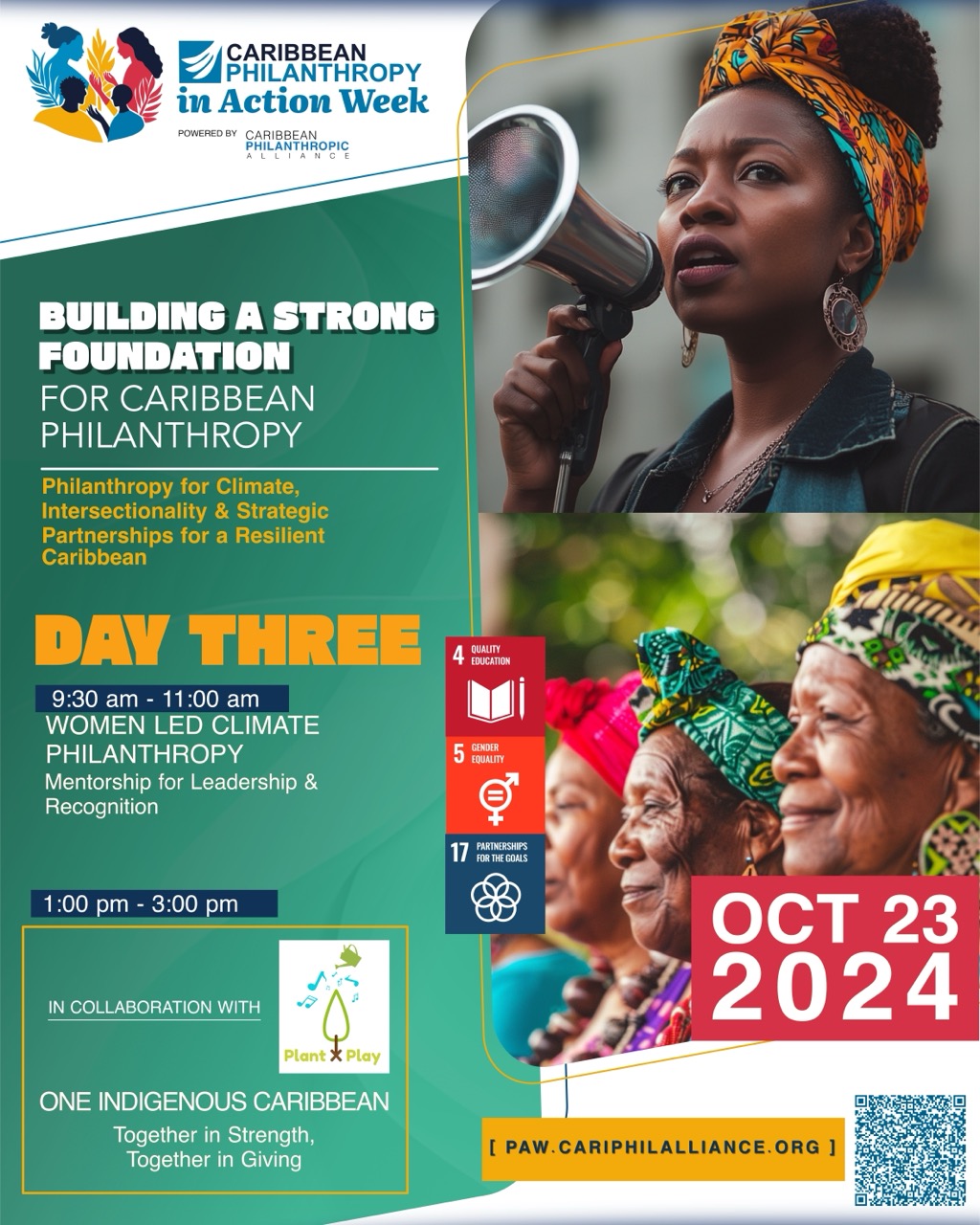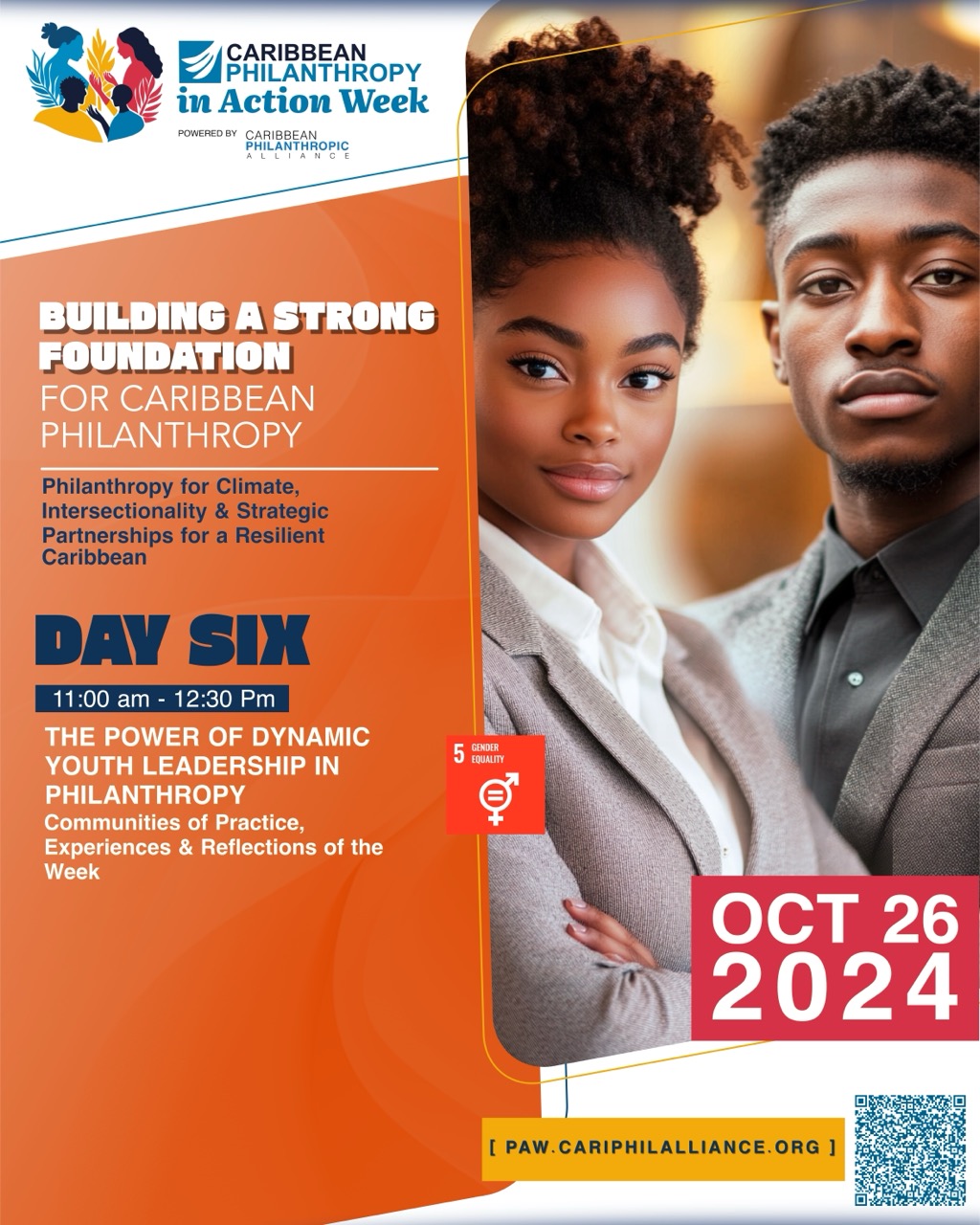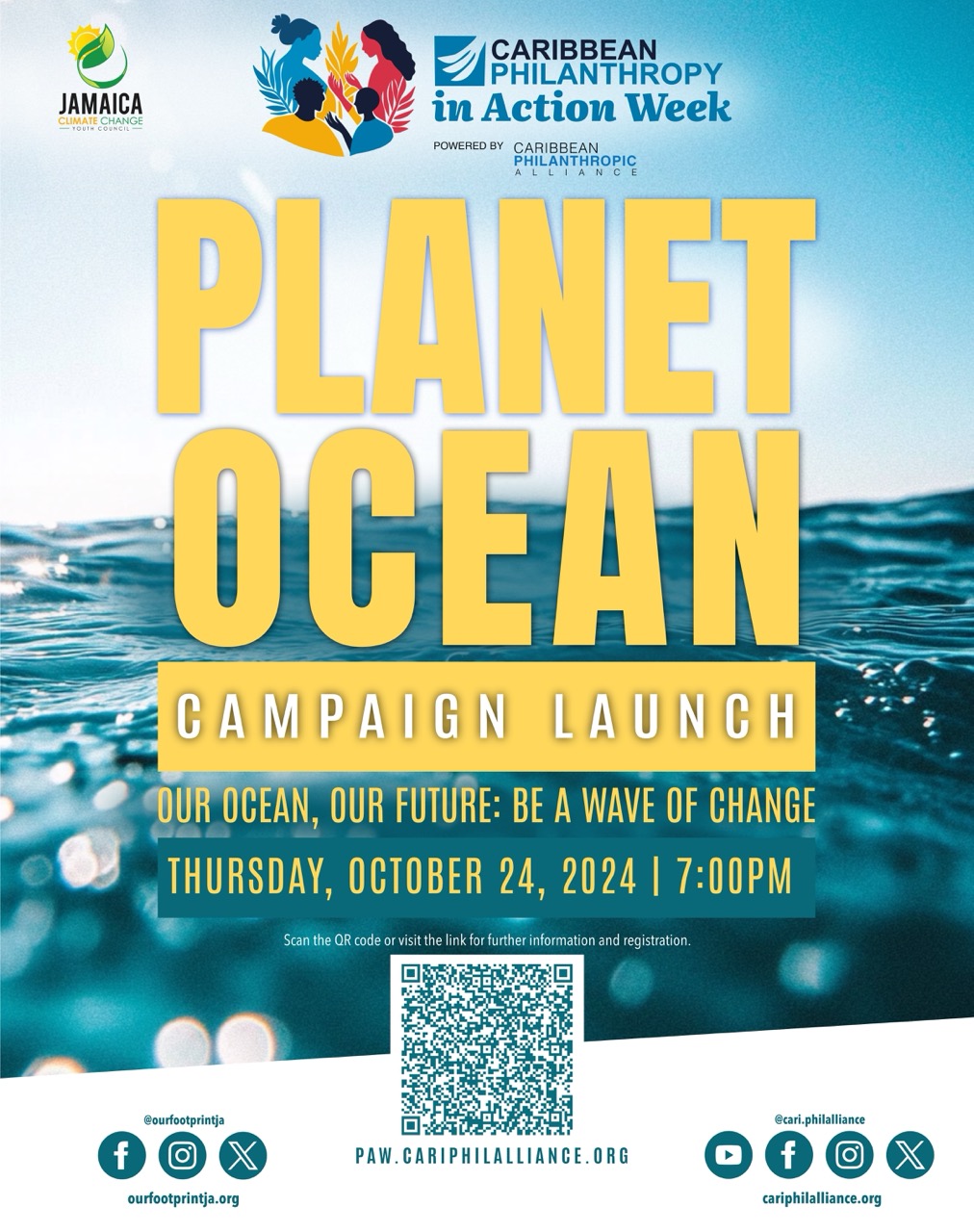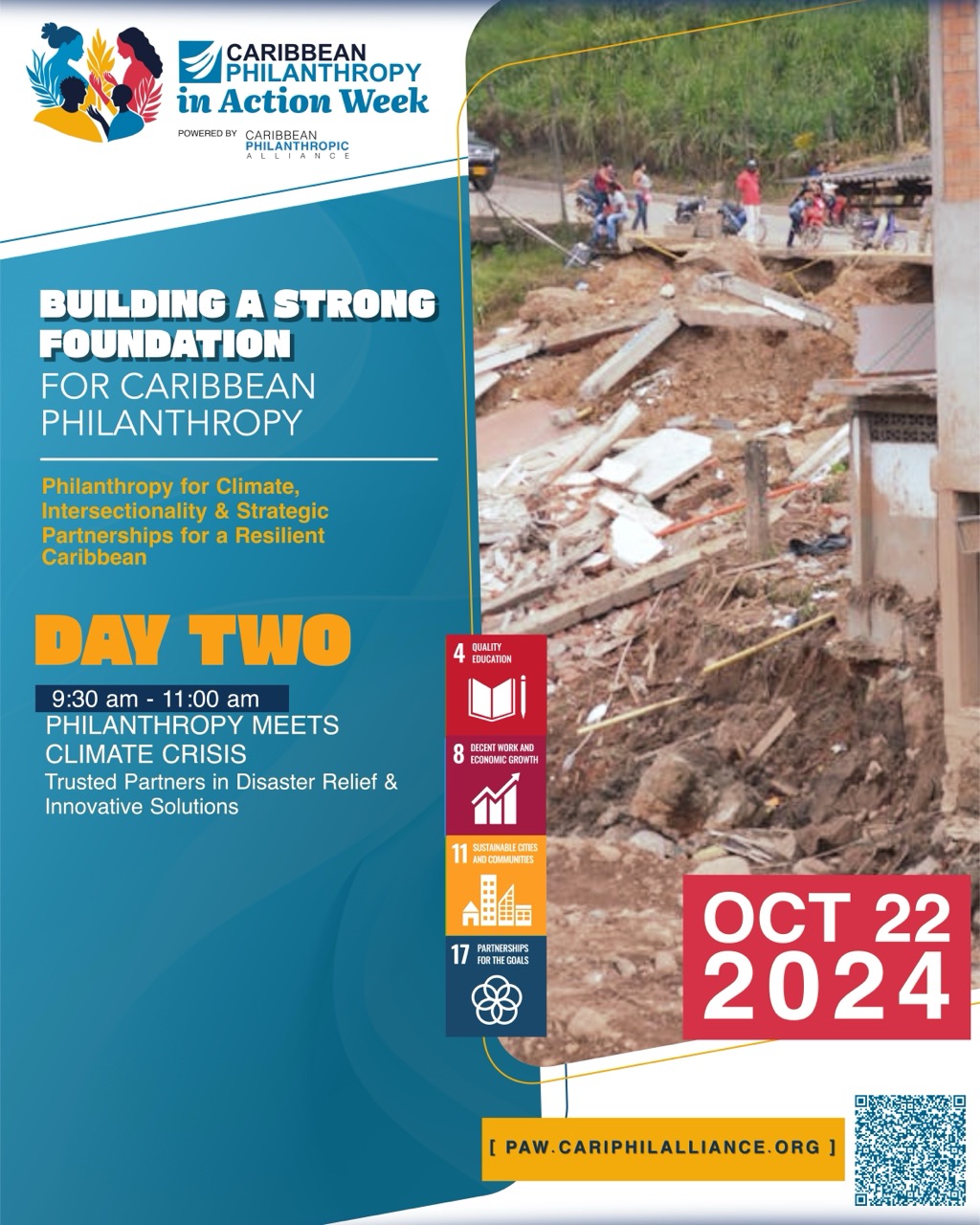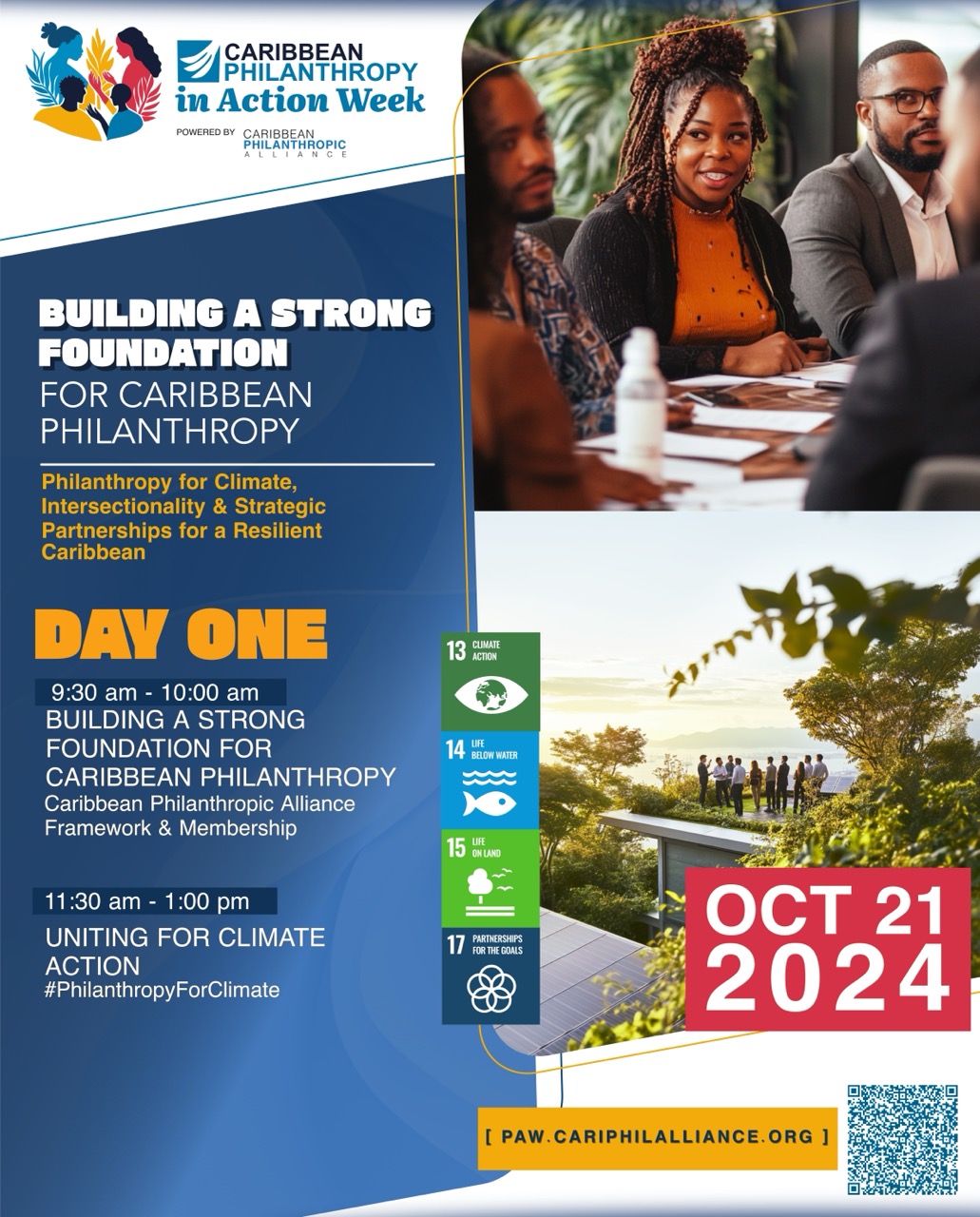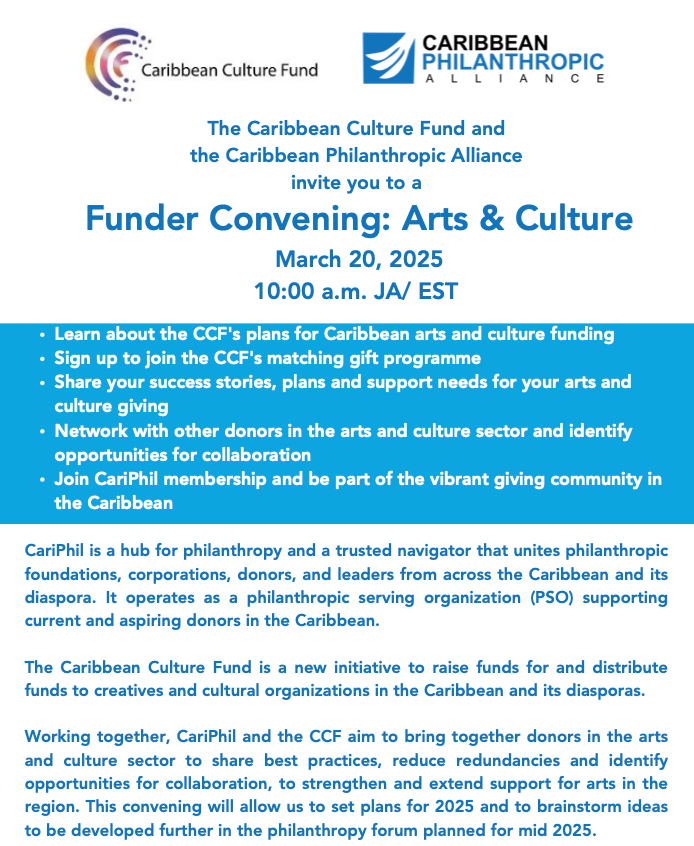
Author: admin
Morning Coffee with CEO Anthea McLaughlin & Special Guests
Date: March 21, 2025
Time: 9:30 a.m. – 11:30 a.m.
Location: Pomme Palais Café & Lotte New York Palace Lounge, 29 E 51st Street, New York
Join us for an engaging morning coffee session with Anthea McLaughlin, CEO of the Caribbean Philanthropic Alliance (CariPhil), alongside esteemed special advisors and partners.
This is an open invitation for philanthropists, investors, community leaders, and visionaries passionate about advancing Caribbean-led initiatives. Don’t miss this opportunity to connect, collaborate, and create impact.
Time: 3:00 p.m. – 5:00 p.m.
Location: 400 Park Ave, 2nd Fl Meeting Room (between 54th and 55th St), New York
Join us for Special Conversations with CariPhil, an exclusive opportunity to engage with the Caribbean Philanthropic Alliance (CariPhil) in an intimate setting. This event is by appointment only, offering a focused and personalized discussion on impactful initiatives and investment opportunities.
This is an invitation for philanthropists, investors, community leaders, and changemakers dedicated to driving meaningful progress in the Caribbean. Don’t miss this opportunity to connect, collaborate, and contribute to transformative efforts.
RSVP is required – secure your spot by emailing pamrivas00@gmail.com.
Why Attend?
- Gain insights into CariPhil’s mission, promising initiatives, and investment opportunities
- Explore ways to become a part of a growing network of changemakers
- Learn about opportunities to showcase your projects at the Premier Caribbean Philanthropy Forum
Caribbean Philanthropy in Action Week 2024: Day 3 – Session 2
Session Summary
Session #2: One Indigenous Caribbean. explored indigenous philanthropy and leadership across the Caribbean region and its roots in ancestral wisdom. The session brought together indigenous leaders from Guyana, Suriname, Jamaica, and Puerto Rico to discuss traditional knowledge systems, women’s leadership, environmental protection, and cultural preservation. Speakers shared experiences from various territories, discussing challenges and opportunities in preserving indigenous cultures while adapting to modern challenges.They also emphasized the importance of recognizing and supporting Indigenous-led initiatives across the Caribbean, the importance of reciprocity in indigenous cultures and the need for more inclusive funding mechanisms that respect traditional governance structures. We had a total of 62 participants.
Summary Discussion:
- Championing Indigenous Funds for Sovereignty and Sustainability
Indigenous leaders from Guyana, Suriname, and Jamaica called for the establishment of dedicated indigenous funds to safeguard their communities’ land sovereignty, cultural heritage, and environmental stewardship. Such funds would ensure resources are allocated to support indigenous-led initiatives that align with their unique cultural practices and environmental priorities. - Recognizing Indigenous Environmental Sustainability Practices as a Way of Life
Environmental sustainability and conservation are deeply embedded in the practices of indigenous communities across the Caribbean. These life-long traditions demonstrate a profound understanding of and respect for the natural world. The philanthropic sector is urged to recognize and amplify the value of indigenous knowledge systems in addressing environmental challenges; provide training opportunities that allow for the integration of indigenous practices with modern sustainability efforts; and adopt principles of reciprocity and cultural sensitivity. This approach ensures that partnerships are equitable and mutually beneficial, reflecting the lived experiences and values of indigenous peoples - Respecting Indigenous Communities through Inclusion and Advocacy Indigenous leaders emphasized the importance of inclusive practices that respect their autonomy and leadership by: actively engaging indigenous representatives in decision-making processes at all levels; supporting their advocacy for policies that protect their rights and resources and deconstructing Colonial Systems.
Key Themes
- Indigenous knowledge systems and environmental stewardship
- Women’s leadership in indigenous communities and climate action
- Traditional governance structures
- Food sovereignty and sustainable agriculture
- Cultural preservation and decolonization
- Regional collaboration and capacity building
- Land rights and resource protection
Notable Initiatives & Announcements
- Rupununi Music & Arts Festival’s environmental conservation programs
- Wapichan Wiizi Women’s Movement’s gender equality initiatives
Session 2 Speakers Highlights
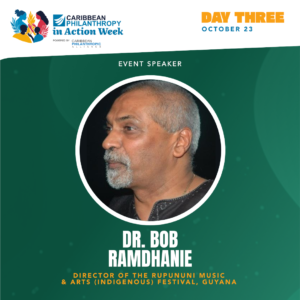
Dr. Bob Ramdhanie presented arts-based environmental initiatives
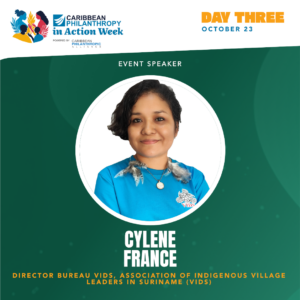
Cylene France discussed VIDS’s work in Suriname
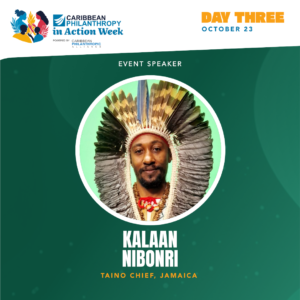
Kalaan Nibonrix presented on Taino cultural preservation
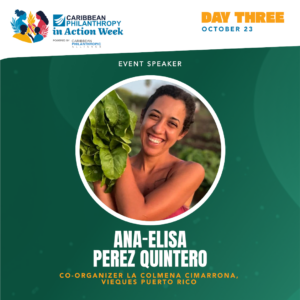
Ana Elisa Perez Quintero
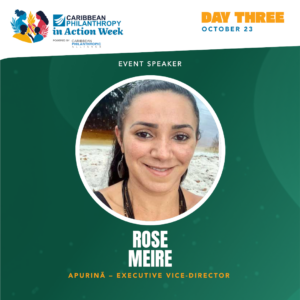
Rose Meire
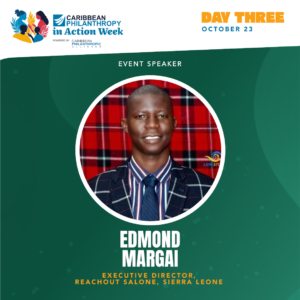
Edmond Margai
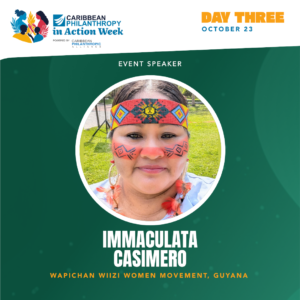
Immaculata Casimero shared indigenous women’s leadership experiences
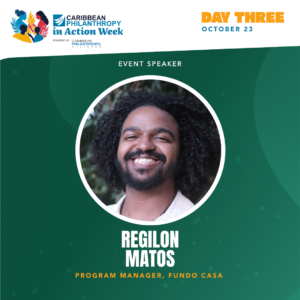
Regilon Matos
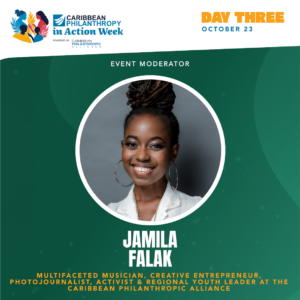
Jamila Falak

Professor David Akombo
Caribbean Philanthropy in Action Week 2024: Day 6
Session Summary
CariPhilAlliance Emerging Leaders & Youth Hub Convening. This session focused on fostering dynamic youth leadership within communities of practice in philanthropy. With a focus on the value of communities of practice, young leaders reflected on their experiences and participated in knowledge-sharing activities. Presenters showcased successful initiatives, highlighted lessons from disaster response fundraising campaigns, and discussed how to foster collaboration among philanthropic organizations. The session provided actionable insights into mentorship, storytelling, and relationship-building in the philanthropic sector. The panelists and moderators engaged participants in conversations on the benefits of active involvement in communities of practice and the importance of effective communication using storytelling. Fifty-five (55) attendees participated in the session.
Key Themes
- Youth Leadership in Philanthropy
- Disaster Relief and Fundraising
- Collaboration and Communities of Practice
- Mentorship and Knowledge Sharing
Achievements & Fundraising Tips:
Grassroots Advocacy and Policy Makers Amplifies Your Cause
Bonefish & Tarpon Trust:
- Grassroots Advocacy and community engagement moved Mangrove Restoration from 100,000 to 1 million
- Work with policymakers to support project(s) and to attract media houses to pair stories or link related policies to projects while simultaneously opening opportunities for young emerging leaders to be placed in policy spaces
- Engage with community partners to build local capacity
- Join rigorous science to monitor and guide future efforts
Have a Clear Mission and Focus
The Greater Change Foundation
- Tenacity & Patience is required for fundraising
- Fed over 300 homeless people in Kingston, Jamaica
Use Personal Stories for Impact
Youths for Excellence:
- Use your personal stories to transcend the institutional stories and to mobilize people to your cause.
- Stories must be understandable and demonstrate what you have done
- Work with beneficiaries to tell stories and to demonstrate impact of your work
- Stories provided empathy and it “takes cash to care”
Mentorship & Peer Learning Matters
Rotoract Club, Turks and Caicos
- Membership provides insights and key lessons of strategies of failed or successful strategies
- Membership opens cross-border collaboration, and influenced by the mentors reach beyond borders
- With one mentor you can gain an entire network
Diversify Fundraising Strategies & Be Transparent
Technos Pa Mi Gente, Puerto Rico
- Fundraising in on-going, and after a disaster, media attention is reduced, and economic instability is still present, and there is an on-going need for recovery
- Outreach events such as annual 5-K run creates opportunities to be seen through campaigns and ads, and provide opportunities to spread the word about organizations work, impact and beneficiaries
- Create networks and partnerships to maximize impact, share resources and reach more people
- Enter into strategic and corporate sponsored alliances, and take advantage of in-kind donations, technical assistance
- Apply for Government grants to co-fund and augment private donations and other funding
- Attend conferences, and gain access to innovations, success stories and networks
- Consistently document and share progress to demonstrate transparency with funders and beneficiaries on all social media platforms and other communication vehicles
Notable Initiatives & Announcements
- Bonefish & Tarpon Trust Mangrove Restoration in the Bahamas: A grassroots project involving youth, aiming to plant over one million mangroves, with a focus on scaling up community engagement and educating the public on the ecological importance of mangroves.
- Hurricane Relief Campaigns: Successful strategies used to mobilize resources and provide aid for disaster-stricken communities, showcasing how storytelling can build meaningful connections with funders.
Key Recommendations
- Expand Youth Participation: Encourage young individuals to join and actively participate in communities of practice to foster leadership and collaboration.
- Promote Storytelling: Utilize storytelling as a key communication strategy to build relationships with potential funders and stakeholders.
- Strengthen Disaster Preparedness: Share best practices and lessons learned from successful disaster relief campaigns to enhance future efforts.
- Scale Up Collaborative Efforts: Break down silos between organizations to amplify the impact of shared goals and initiatives.
- Focus on Mentorship: Develop structured mentorship programs to support emerging youth leaders in philanthropy.
Speaker Highlights – One Word Inspiration for Emerging Youth Philanthropy Leaders
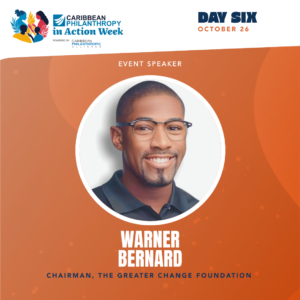
Warner Bernard shared strategies for creating impactful community programs that inspire collective action.
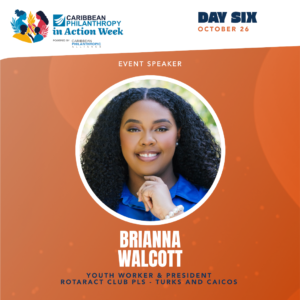
Brianna Walcott highlighted leveraging youth networks to enhance advocacy and community engagement.
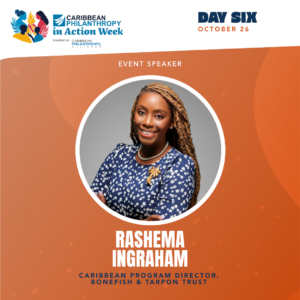
Rashema Ingraham shared her experience leading mangrove restoration projects in the Bahamas and emphasized the role of youth and community collaboration in conservation efforts.
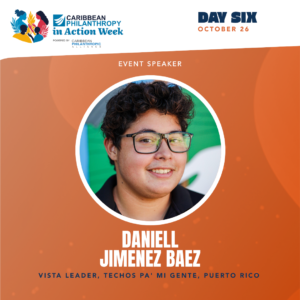
Daniell Jimenez Baez focused on fostering inclusivity to ensure equitable outcomes in philanthropy.
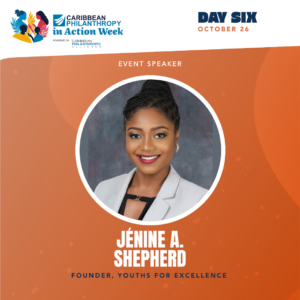
Jenine A. Shepherd discussed the educational initiatives spearheaded by her organization, highlighting how these efforts equip young leaders with the tools to drive change.

Jamila Falak – Dynamic- Reflects who we are and inspires all of us
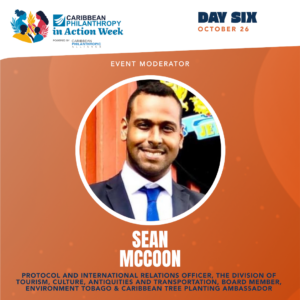
Sean Mendez – Trailblazers- All are within countries, to pass on knowledge to others, and those who wish to have a voice
Caribbean Philanthropy in Action Week 2024: Day 4
Summary of Planet Ocean Campaign Launch – October 24, 2024 – The Planet Ocean campaign launch featured three key presentations focusing on ocean literacy, ocean health, and ocean threats. The event emphasized the critical role of oceans in climate regulation and human survival. Simultaneously, Caribbean Philanthropic Alliance coordinated accelerated regional and national actions focused on climate justice and philanthropy across multiple countries.
Key Themes:
- Ocean literacy and education
- Marine conservation and protection
- Climate change impacts on ocean health
- Human threats to ocean ecosystems
- Community engagement and advocacy
Notable Initiatives:
- IOC-UNESCO’s Ocean Literacy in the Caribbean program
- Blue Schools initiative targeting Caribbean educational institutions
- Establishment of marine protected areas in Jamaica
- International efforts against deep-sea mining
- Caribbean Garbage Patch cleanup efforts
Key Recommendations
- Support sustainable seafood choices
- Advocate for ocean protection policies
- Reduce plastic consumption
- Engage in community conservation efforts
- Support marine protected areas
- Stay informed about ocean threats
- Participate in coastal cleanup initiatives
Speakers & Highlights:
- Dr. Lorna Inniss :
- Presented seven principles of ocean literacy
- Discussed regional ocean education initiatives
- Emphasized ocean’s role in climate regulation
- Rhianne McKenzie :
- Detailed ocean health indicators
- Discussed marine protected areas management
- Highlighted sustainable fishing practices
- Robin Young :
- Outlined major ocean threats
- Discussed impacts of climate change
- Addressed emerging concerns like deep-sea mining
Caribbean Philanthropy in Action Week 2024: Day 3 – Session 1
Key Themes
Women-Led Climate Philanthropy-Mentorship for Leadership & Recognition.
Transforming Women Leadership through Inclusion
- Insights shared by women leaders from Africa and the Caribbean underscored the profound impact of women-led initiatives. Programs such as the Trees That Feed Foundation showcase the transformative power of empowering women in development efforts. In Rwanda, government policies that mandate gender inclusion at every level of governance serve as a valuable blueprint for the Caribbean, demonstrating how structural inclusion can catalyze societal progress.
Multiplying Effect through Financial Empowerment
- The financial empowerment of women generates a multiplier effect that benefits families, communities, and society as a whole. There is a critical need to strengthen support systems for women’s initiatives by -establishing mentorship and sisterhood networks; offering targeted capacity-building programs to equip women with essential skills; and facilitating women’s access to capital, ensuring that they have the financial tools necessary to lead impactful development projects.
Addressing Violence Across the Region
- Women leaders poetically expressed that while peace is a universal aspiration, there is an urgent need to acknowledge and address the multiple forms of violence that exist within communities across the region. Comprehensive solutions should prioritize safety, justice, and the empowerment of women and girls as key components of societal resilience.
Building a gender inclusive philanthropy ecosystem is now required to:
- Advocate for gender-inclusive governance frameworks at the regional level, drawing inspiration from successful global models.
- Encourage partnerships between philanthropic organizations and women’s networks to co-design solutions that address specific barriers faced by women leaders.
- Develop region-specific metrics to measure the success of women-led initiatives, ensuring accountability and the sharing of best practices.
Key Themes:
- Women’s lead in climate action globally
- Women are natural leaders and transformative with the innate drive and grounded knowledge to support their families and communities.
- Financial empowerment provides a multiplier effect and builds resiliency – personal, family, community
- Political will is required for gender inclusion at all levels of government
- Use international models for replication such as Rwanda Monitoring & Evaluation systems to monitor GI and mandatory land ownership for women which is used as critical lever for women financial independence and empowerment
Notable Initiatives & Announcements
- CariPhilAlliance WoMIND & BeYOND regional capacity-building initiatives
- Women Impact Awards: A new recognition platform celebrating outstanding women leaders who are driving transformative change in their communities.
- Climate Conscious Podcast Collaboration with CariPhilAlliance: A partnership to launch Caribbean Women for Climate Justice (CW4J) designed to dismantle existing biases and unlock financial resources to support women-led philanthropic actions, while also highlighting their stories and achievements.
Key Recommendations
Harnessing Women’s Leadership:
- Empower Women as Climate Leaders: Recognize and amplify women’s unique perspectives and skills in climate action.
- Support Women’s Organizations: Invest in women-led organizations and initiatives to strengthen their capacity and impact.
- Gender-Responsive Climate Policies: Develop and implement policies that explicitly address gender equality, gender-based discrimination and women’s empowerment in climate action.
- Inclusive Governance: Ensure women’s participation in decision-making processes at all levels of government.
Economic Empowerment:
- Secure Land Rights: Promote secure land tenure for women to enhance their economic opportunities and resilience.
- Financial Inclusion: Expand access to financial services, such as loans and insurance, to empower women economically.
- Skill Development and Entrepreneurship: Provide training and support for women to develop entrepreneurial skills and start businesses.
Monitoring and Evaluation:
- Implement Robust Monitoring Systems: Adopt effective monitoring and evaluation systems to track progress on gender equality and women’s empowerment in climate action.
- Learn from Best Practices: Explore and adapt successful models, such as Rwanda’s, to strengthen monitoring and evaluation efforts.
Building Resilience:
- Invest in Social Protection: Strengthen social protection programs to support women and their families during climate-related shocks and stresses.
- Community-Based Adaptation: Empower communities, particularly women, to lead local adaptation initiatives.
Speakers Highlights
One Dream, One Goal and Desire for Women to move their work forward?
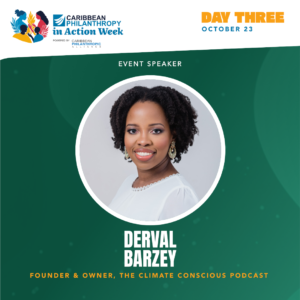
Derval Barzey presented on climate conscious leadership Aspirational Dream: Shift generic systems to systems that cater and should be accountable to women multiple roles as policy makers, care takers, advocates, and the list goes on.
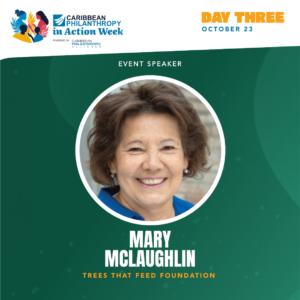
Mary McLaughlin shared Trees That Feed Foundation initiatives Aspirational Goal: Stay together, and let’s move our talk to action to make our respective agendas in education, agri- businesses happen in our countries
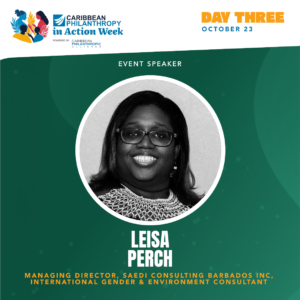
Leisa Perch discussed gender and environment intersections including the importance of creating policies sensitive to the multiplicity of needs of women Aspirational Goal: Peace is a desired goal, yet violence needs to be acknowledged given the numerous acts of violence against women
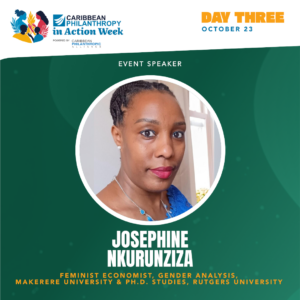
Ms. Josephine Nkurunziza shared Rwanda government’s political will and trajectory and successful journey towards Gender Inclusion. Aspirational Goal: To facilitate and support continuous efforts to build sisterhood networks to fight against the world that is not fair to women.

Ms. Che Greenwood shared BECT programs to support women pilot projects and start up funding Aspirational Appreciation: Extend grace to others, and herself, and extend gratitude to those women who have set a firm foundation and supported other women to grow and flourish.
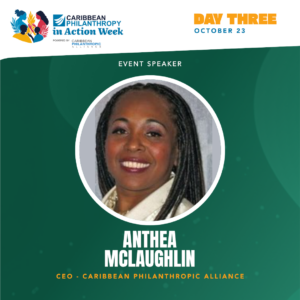
Ms. Anthea McLaughlin shared the importance of women leadership in philanthropy and leading climate actions. Aspirational Goal: Respect for women’s contributions, and with respect, acknowledgement, appreciation, inclusion and recognition follows.
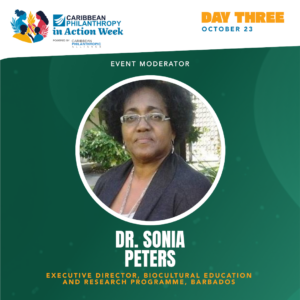
Ms. Sonia Peters facilitated. Aspirational Goal: Unity, and working together towards a singular focus, as emerging violence, for example, is a reoccurring issue across the Caribbean.
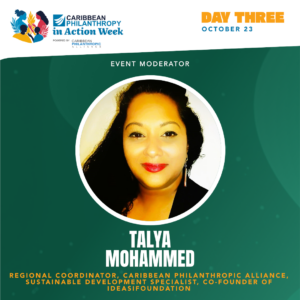
Ms. Talya Mohammed facilitated. Aspirational Goal: Tolerance and patience with each other, grow in grace and treat each other with each other and togetherness
Caribbean Philanthropy in Action Week 2024: Day 2
Session 1
Philanthropy Meets Climate Crisis – The morning session examined multiple facets of climate crisis response, featuring presentations from regional disaster management, financial institutions, and humanitarian organizations. Discussions centered on Hurricane Beryl’s impact and recovery efforts, showcasing various approaches to disaster resilience and recovery. Speakers highlighted innovative financial instruments and community-based initiatives while emphasizing the need for coordinated regional responses.
Key Approaches to Building Resilience and Disaster Management were shared:
- All-Hazards Approach: CDEMA (Caribbean Disaster Emergency Management Agency) utilizes a multi-agency, all-hazards approach to disaster resilience, addressing prevention, preparedness, response, and recovery phases. Collaboration with philanthropy and private sectors strengthens this framework.
- Case Study – Hurricane Beryl: Lasco Chin Foundation, Philanthropic leader in the Caribbean, demonstrated an agile, replicable model by conducting rapid assessments, supporting micro and small enterprises (MSEs), and partnering with local organizations to expedite relief and recovery.
- Funding Mechanisms- Tools like the Caribbean Catastrophe Risk Insurance Facility provide parametric insurance and rapid payouts, aiding post-disaster rebuilding. Institutions like the Suriname National Development Bank support reconstruction financing, concessional loans for NGOs, and key sectors such as agriculture and tourism.
Notable Initiatives & Announcements:
- CDEMA’s enhanced All Hazard regional response framework
- Caribbean Catastrophe Risk Insurance Facility (CCRIF) parametric insurance products
- Lasco Chin Foundation’s small business disaster relief recovery program
- It is Not a Cause (ITNAC) & Response Caribbean regional disaster relief efforts
- Suriname National Development Bank Ltd Innovative Disaster risk financing
- International Organization for Migration (IOM) Climate Induced Displacement and Migration Responses
- Caribbean Philanthropic Alliance Trusted Partners Initiative to support hurricane recovery
- Fundadora de Techos Pa’ Mi Gente – Disaster Relief Programme
Key Recommendations:
- Build Economic Resilience and develop flexible funding mechanisms and streamlined processes are essential.
- The Caribbean Philanthropic Alliance should partner and work towards the development of a disaster relief fund to accelerate funding and build stronger partnerships.
- Data-driven decision-making is vital for ensuring targeted and effective interventions.
Session 2
Funders Spotlight: Where Philanthropy Meets Creativity -A New Era for Arts and Culture in the Caribbean. The afternoon session focused on sustainable funding strategies for Caribbean arts and culture. Presentations highlighted successful models from both Caribbean and African contexts, emphasizing digital fundraising innovations and diaspora engagement. Discussions explored practical approaches to cultural philanthropy, with particular attention to data-driven decision-making and regional collaboration frameworks.
Challenges in Arts and Culture Philanthropy
- Data and Measurement: A lack of comprehensive data and standardized metrics limits the ability to measure the long-term impact of arts and culture initiatives. Establishing frameworks to track outcomes can enhance accountability and attract investment.
- Balancing Commercial and Artistic Goals:Artists and organizations face challenges in maintaining artistic integrity while pursuing commercial success. Developing hybrid models that respect both priorities is essential.
- Securing Sustainable Funding: Consistent funding remains a significant hurdle. New approaches to diversify revenue streams are critical for the longevity of arts initiatives.
- Climate Change Advocacy: Creative projects such as public art installations and performances using clean energy serve as compelling tools to raise awareness and drive climate action.
- Cultural Exchange: Initiatives fostering cross-cultural dialogue can bridge divides, promote mutual understanding, and strengthen regional identities.
- Economic Development: The arts and culture sector plays a critical role in job creation, tourism, and economic growth, demonstrating its value beyond creative expression.
- Community Building: Arts programs enhance social cohesion, provide a platform for marginalized voices, and foster community resilience.
Key Themes
- Regional coordination and collaboration to meet climate crisis
- Digital transformation in philanthropy to support Arts & Culture
- Funding mechanisms should be sustainable funding and use data-driven decision making
- Diaspora engagement
Key Learnings
- Public-Private Partnerships (PPP): Collaboration with government agencies and private sector entities can unlock scalable funding opportunities for the cultural sector.
- Matching Funds: Leveraging donor matching programs can amplify the impact of individual contributions and attract broader support.
- Digital Engagement: Online fundraising, digital storytelling, and diaspora-focused campaigns are expanding the financial reach of cultural projects, democratizing access to philanthropy.
- Impact Investing: Integrating social and financial returns into arts and culture projects enables sustainable funding and demonstrates the tangible benefits of cultural investment.
- Philanthropic Foundations: Partnering with foundations for long-term support ensures financial stability and the growth of the cultural ecosystem.
Notable Initiatives & Announcements
- Caribbean Culture Fund’s second funding call
- Africa Culture Fund
- CariPhil & Culture Fund Convening & Funder Database Partnership
Key Recommendations
- Financial Support: Diaspora communities can provide vital financial contributions to support Caribbean arts and culture organizations.
- Knowledge Sharing: Sharing expertise, best practices, and networks helps strengthen cultural initiatives and enhances global collaboration.
- Advocacy: Diasporic advocates are uniquely positioned to promote policies and initiatives that bolster the arts and culture sector.
- Indigenous and Cultural Preservation:
- Respect Indigenous Art Forms by ensuring indigenous art and cultural practices are integrated into mainstream projects while respecting their origins and values.
- Training in Indigenous Knowledge Systems for philanthropy by prioritizing cultural education and training programs that sustain traditional practices and bridge indigenous wisdom with contemporary arts.
- Cultural Sensitization for stakeholders by deconstructing colonial language and frameworks to promote respect for Caribbean cultural diversity and foster an equitable arts ecosystem.</
By integrating innovative funding strategies and centering on climate, cultural heritage, and diaspora engagement, philanthropy can propel the Caribbean arts and culture sector into a transformative era, driving economic resilience, social cohesion, and sustainable development.
Speaker Highlights
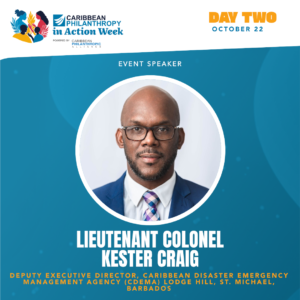
Lt. Col. Kester Craig: Regional disaster response coordination
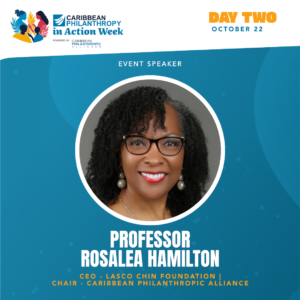
Prof. Rosalea Hamilton
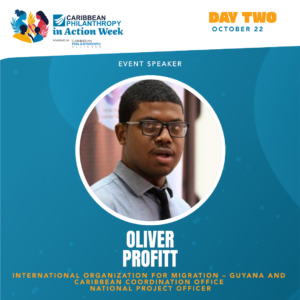
Oliver Profit
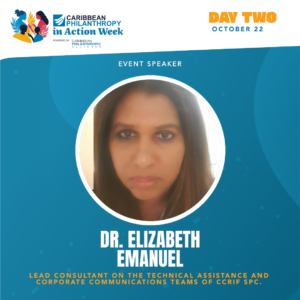
Dr. Elizabeth Emanuel: Innovative disaster risk financing
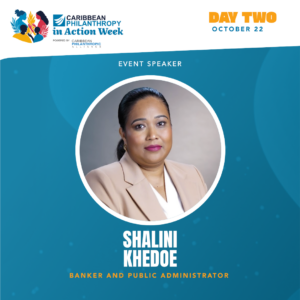
Shalini Khedive
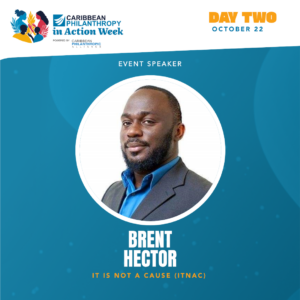
Brent Hector
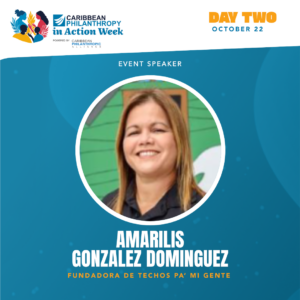
Amarilis Gonzalez Dominguez
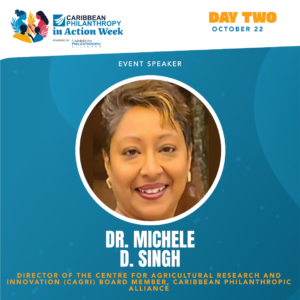
Dr. Michelle D. Singh
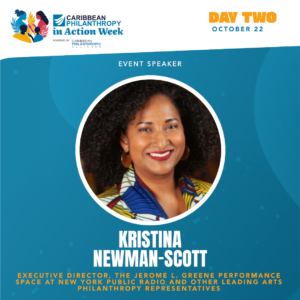
Kristina Newman-Scott: Digital fundraising strategies
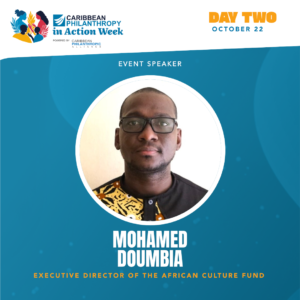
Mohamed Doumbia: African Culture Fund model
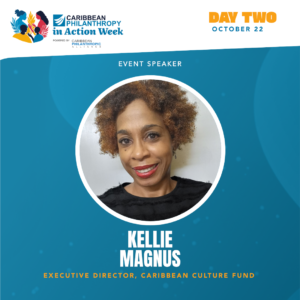
Kellie Magnus: Caribbean cultural funding initiatives
Caribbean Philanthropy in Action Week 2024: Day 1
The first day of the Caribbean Philanthropic Alliance (CariPhilAlliance) event brought together 155 participants to discuss transformative approaches to regional philanthropy and climate action. The sessions highlighted the Caribbean’s unique vulnerability to climate change and emphasized the need to reshape philanthropy to better serve local needs introduced by Ms. Anthea McLaughlin, CEO, Caribbean Philanthropic Alliance and Ms. Rosalea Hamilton, CEO, LASCO Chin Foundation, Chair, Caribbean Philanthropic Alliance. Key speakers including Ms. Dana Francois, Program Officer for Family Economic Security Haiti, LAC, W. K. Kellogg Foundation and President, Haiti Biodiversity Fund, Part of Caribbean Biodiversity Fund Network, Ms.Susan Batten-Taylor, Vice-Chair, Caribbean Philanthropic Alliance & President and Chief Executive Officer of Association of Black Foundation Executives (ABFE) and Auro Fraser, Special Advisor, Caribbean Philanthropic Alliance & Caribbean Regional Coordinator/Program Manager Network Grants, Open Society Foundations advocated for moving beyond traditional project-based funding toward systemic change and community-led initiatives.
The discussions centered on three main areas:
1) strengthening regional philanthropic infrastructure;
2) developing robust climate resilience strategies; and
3) enhancing cross-sector collaboration across multiple sectors.
Notable developments included recent W.K. Kellogg, Pockets of Hope led by W.K. Kellogg Foundation & Partners, the launch of the CariPhilAlliance CLASP (Climate Philanthropy and Strategic Partnerships) initiative and plans for closer integration with the global #PhilanthropyForClimate movement led by WINGS network. Speakers also emphasized the critical need for improved data collection, transparent climate finance tracking, and mechanisms to address loss and damage from climate impacts. The event demonstrated a clear shift toward more locally-driven, collaborative approaches to philanthropy in the Caribbean, with a strong focus on building sustainable, climate-resilient communities through coordinated regional action.
Welcome & Plenary Summary
Welcome & Join – Ms. Anthea McLaughlin, CEO, Caribbean Philanthropic Alliance introduced Philanthropy Week, emphasized the urgency of building a strong foundation for Caribbean philanthropy to address challenges like climate change and regional resource allocation disparities. She highlighted CariPhilAlliance’s evolution since its founding in 2019 which currently positions itself as a hub for philanthropy, mobilizing resources, empowering stakeholders, championing equity, and fostering collaboration and leveraging Caribbean strengths.
She outlined four core strategies:
- convening global philanthropy
- advocating for equitable funding
- facilitating collaborative philanthropy
- building regional capacity to facilitate global development goals
Key achievements were shared: mobilized philanthropy to support the planting of 1.5M trees planted across the Caribbean; launched women-led climate philanthropy initiatives; developed an interactive funder database platform to be refined and expanded through strategic partnerships for global and regional philanthropy, and civil society.
Setting the Context & Its Role in Strengthening Caribbean Philanthropy – Ms. Dana Francois, Program Officer for Family Economic Security Haiti, LAC, W. K. Kellogg Foundation and President, Haiti Biodiversity Fund, Part of Caribbean Biodiversity Fund Network delivered a comprehensive vision for Caribbean philanthropy by 2050, calling for redefining philanthropy to better address the specific needs of the Caribbean region. This includes shifting from traditional grantmaking models to more flexible and evaluation approaches that measure the impact of philanthropic investments and using data to inform decision-making. She emphasized that the Caribbean is implementing models for global sharing such as the Bridgetown Initiative and Haiti Food System Alliance that supports 40,000 farmers and provides food to 750,000 families. Francois stressed the need for systems-focused approaches and blended finance mechanisms to address regional challenges.
Dana Francois delivered a comprehensive vision for Caribbean philanthropy by 2050, emphasizing climate resilience and sustainable development. She highlighted Haiti Food System Alliance’s success in supporting 40,000 farmers and providing food to 750,000 families. Francois stressed the need for systems-focused approaches and blended finance mechanisms to address regional challenges.
CariPhilAlliance Role – Susan Taylor Batten discussed Philanthropy Serving Organizations’ (PSOs) role in strengthening regional philanthropy through peer networks, policy influence, and data collection. Auro Fraser presented Open Society Foundation’s work in the Caribbean, emphasizing grassroots funding and climate justice initiatives. He stressed the importance of meeting communities “where they are” and providing flexible, long-term support.
Session 1 Summary
United for Climate Action – Featured presentations on #PhilanthropyForClimate movement, IAF’s community philanthropy approach, and climate finance data tracking. Key speakers included:
- Erika Miller (WINGS): Presented the 7-pillar framework for climate philanthropy
- Cecilia Babb: Discussed IAF’s grassroots development approach
- Sasha Jattansingh: Detailed loss and damage frameworks
- Malini Maharaj: Explained climate finance tracking mechanisms
The session concluded with calls for increased regional collaboration and data-driven climate action.
United for Climate Action featured presentations on #PhilanthropyForClimate movement, and IAF’s community philanthropy approach
Other key speakers included:
- Maria Eugenia Paez, LAC, WINGS, Senior Coordinator, representing WINGS (Worldwide Initiatives for Grantmaker support) – presented WINGS global philanthropy ecosystem of over 220 members representing 60+ countries and expressed its membership relationship, with the Caribbean Philanthropic Alliance and support to launch the CLASP – Climate Philanthropy & Strategic Partnerships regional initiative, and partnership to lead the International Philanthropy Commitment on Climate Change in the Caribbean & territories. She highlighted the development of a Latin American and Caribbean working group aimed at fostering stakeholder partnerships and influencing policy. Maria’s insights on promoting intersectional approaches to climate philanthropy set a powerful precedent for collaboration across borders.
- Erika Miller, Head of Climate, Montreal, Quebec, WINGS – Presented the 7-pillar framework for #philanthropyforclimate for scaling climate philanthropy- Pillar 1: Education & Learning; Pillar 2: Commitment of Resources; Pillar 3: Integration; Pillar 4: Endowments & Assets; Pillar 5: Operations to Assess & Reduce Carbon Footprint; Pillar 6:Influence and Advocacy; Pillar 7: Transparency. She shared that the model—focuses on education, resource commitment, climate integration, responsible endowments, greening, advocacy, and transparency—offers a clear path for philanthropy to maximize and measure its impact across the Caribbean and Latin America.
- Cecilia Babb, Local Liaison, Eastern & Southern Caribbean, Inter-American Foundation – Discussed IAF’s grassroots development approach and emphasized the transformative power of community driven philanthropy and emphasized the grassroots ownership as central to sustainable development.
- Marie-Rose Romain Murphy, Co-Founder, Fondation Communautaite-Haitienne & Economic Stimulus Projects for Work and Action (ESPWA) – Shared the importance of building upon the assets of Haitian communities, leveraging community resilient solutions and called for long-term comprehensive approaches to social protection and economic advancement.
- Sasha Jattansingh, Loss & Damage Expert, Climate Diplomacy, Climate Analytics: Detailed the historical and current context of loss and damage frameworks and expanded the view of loss and damage and urged philanthropy to support assessments that focus on the loss of cultural identity and psychosocial impacts including inclusive climate adaptation strategies
- Malini Maharaj, Instructor, Department of Economics, UWI, St. Augustine: Explained the existing climate finance tracking mechanisms
The session concluded with calls for increased regional collaboration and data-driven climate action.
Key Themes:
Climate Action & Resilience
- Caribbean is disproportionately vulnerable to climate risks despite low emissions
- Need for locally-led climate solutions and finance
- Address loss and damage beyond physical impacts, and fund loss and damage assessment focused on emotional damage and impact of human loss
- Promote regional resilience through innovative financing models that pushes the traditional lense of financing for climate
Philanthropy Approach
- Emphasis on reshaping philanthropy to meet Caribbean needs
- Moving from project-based to systemic change
- Integration of climate considerations across all philanthropic work
- Need for better data collection and transparency
- Platform the role of community philanthropy approaches and support community-level resilience initiatives
Partnerships & Collaboration
- Call for increased coordination between local, regional, and global actors
- Multi-stakeholder partnerships including governments, private sector, civil society
- Focus on building regional networks and knowledge sharing
Notable Initiatives & Announcements:
Notable Climate – Related Initiatives & Announcements:
- Launch of CLASP (Climate Philanthropy and Strategic Partnerships) initiative
- Join WINGS hosted International Philanthropy Commitment on Climate Change – PhilanthropyForClimate movement & co-hosted by WINGS and CariPhilAlliance
- Launch of CLASP (Climate Philanthropy and Strategic Partnerships) initiative
Speaker Highlights:
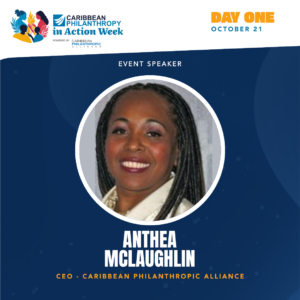
Anthea McLaughlin
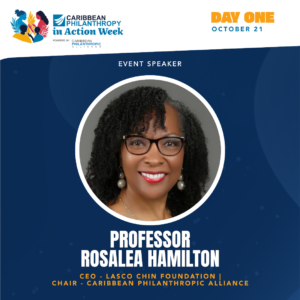
Prof. Rosalea Hamilton
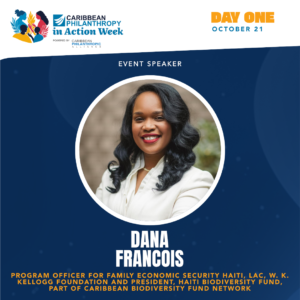
Dana Francois: Emphasized systems change approach
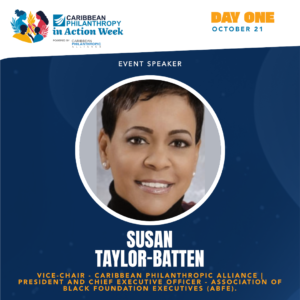
Sasha Jattansingh: Presented on loss and damage framework
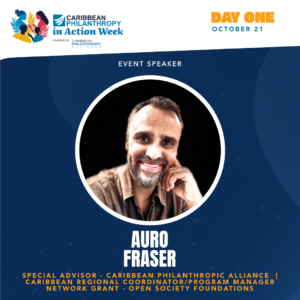
Auro Fraser: Highlighted the importance of grassroots funding
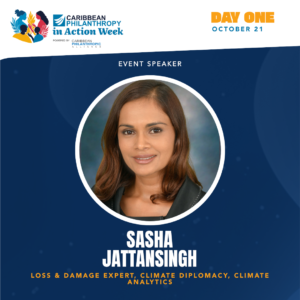
Susan Taylor Batten: Discussed role of philanthropy serving organizations (PSOs)
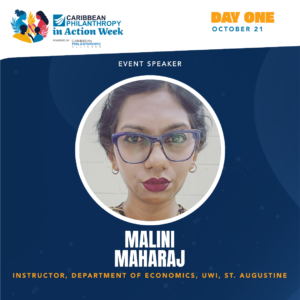
Malini Maharaj: Discussed climate finance tracking
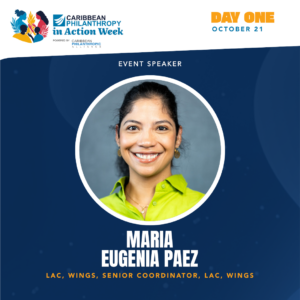
Maria Eugenia Paez
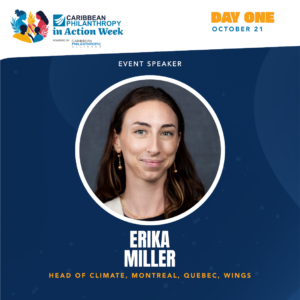
Erika Miller
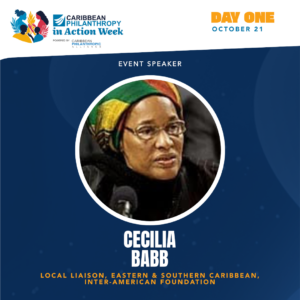
Cecilia Babb
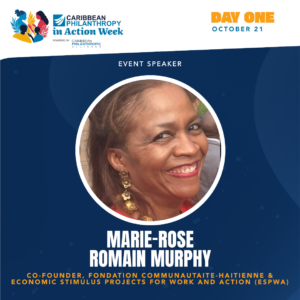
Marie-Rose Romain Murphy
Key Recommendations:
- Strengthen regional philanthropy infrastructure
- Improve data collection and assessment frameworks
- Increase climate finance access and tracking
- Build capacity for community-led initiatives
- Enhance cross-sector collaboration
Caribbean Philanthropy in Action Week 2024
Caribbean Philanthropy in Action Week, which took place from October 21-27, 2024, tackled the full spectrum of the UN’s Sustainable Development Goals (SDGs) through a series of targeted conferences and sessions.
Each day focused on a different theme that related directly to one or more of the SDGs, from addressing hunger and poverty to ensuring climate action, clean water, and gender equality. Sessions like Uniting for Climate Action aligned with SDG 13 (Climate Action), while Philanthropy Meets Creativity incorporated arts and culture to promote inclusive communities (SDG 11).
Through collaborative discussions and strategic partnerships, this weeklong event emphasized the importance of philanthropy in fostering sustainable development across the Caribbean, bringing together thought leaders and advocates to create innovative solutions for the region’s most pressing challenges.
For a detailed schedule of events, highlights, presentations, and outcomes from this impactful week, please visit the official event website at:
Caribbean Philanthropic Alliance Partners to Support Hurricane Beryl Relief Efforts
Press Release
Regional Philanthropy Hub – July 5, 2024 – Hurricane Beryl, the earliest Category 4 storm ever recorded in the Atlantic, has caused widespread devastation across the Caribbean. Lives have been lost, and entire communities face significant damage.
The Caribbean Philanthropic Alliance (CariPhilAlliance) is deeply concerned and actively working with our partners to support relief efforts throughout the region. We have a strong network of trusted partners in the hardest-hit areas, which includes Grenada and its dependents, Saint Vincent and the Grenadines, as well as other impacted areas, Trinidad and Tobago, Barbados, St. Lucia, Dominica, Haiti, Jamaica and Cayman Islands. These partners are currently assessing the damage and urgently need resources for all areas.
Guiding Resources to Effective Response:
CariPhilAlliance is committed to connecting donors with established, reputable organizations on the ground. We will leverage our network and expertise to ensure donations reach those in greatest need.
Focus on Devastated Communities:
- Grenada: Carriacou and Petite Martinique islands suffered “almost complete destruction” with extensive damage to homes, schools, hospitals, and infrastructure.
- Vincent and the Grenadines: Early reports indicate at least 90% of structures may be affected on the island of Union. Widespread damage is reported across the nation.
- Jamaica: Hurricane caused significant damage in the southern belt in the parishes of Clarendon, Manchester and St. Elizabeth and devastated coastal infrastructure as well as displacement of families who are now staying in shelters.
- Barbados: While a full picture of the damage is still emerging, reports indicate that fishing villages were particularly hard-hit
How You Can Help:
- Support Trusted Relief Organizations:
- Visit our website (Hurricane Relief – Caribbean Philanthropic Alliance (cariphilalliance.org)) for our approved list of trusted, and vetted organizations actively engaged in relief efforts.
- Donate Through CariPhilAlliance:
- You may support us to support others across the Caribbean through our philanthropy network and philanthropic outreach.
- Spread Awareness: Share this press release with your networks to encourage support for the Caribbean.
Standing Together for the Caribbean’s Recovery:
The Caribbean is known for its resilience, but communities need our support, especially now. By working collaboratively, we can make a significant difference.
We urge you to stand with us in solidarity. Every action counts.
Contact:
CariPhilAllianceinfo@cariphilalliance.org
+1 876-897-9256 or 1 868-376-4795
Support Trusted Partner Relief Efforts
www.cariphilalliance.org
Support Us to Support Others & Our Work
Donate to Caribbean Philanthropic Alliance
Spread Awareness
Press Release
 Photo -UN Migration Emergency Response visuals – Hurricane Beryl
Photo -UN Migration Emergency Response visuals – Hurricane Beryl 

